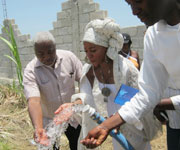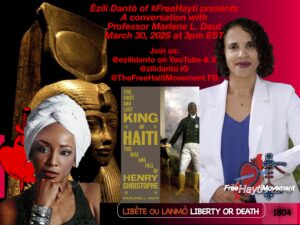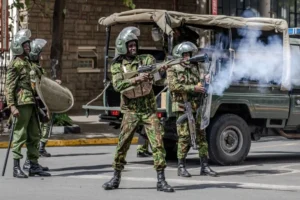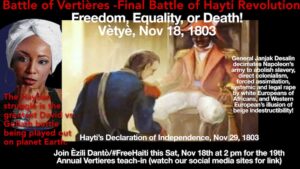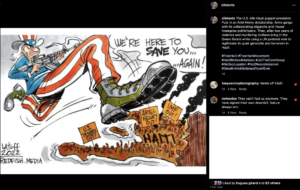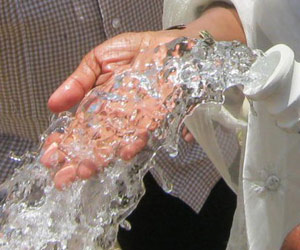””Cholera democracy formally inaugurated “bad boy’ Mickey Mouse (or, is it fascist Mickey Mussolini) to govern occupied Haiti under newly adopted occupation constitution. Over 80% of Haiti voters disenfranchised in the foreign supported cholera elections…” –Ezili Dantò of HLLN, May 14, 2011
**********
Martelly: Haiti’s second great disaster
Haiti’s new president is a friend of coup-plotters, fascists, and armed right-wing groups in his country and abroad.
Greg Grandin, May 4, 2011 | Source: Aljazeera |
(See also: Ezili Dantò on the election of Michel Martelly ; Beating back the elite’s rabid rage; Seismic shifts and Avatar Haiti)

Many of Haiti’s poorest citizens were not dissuaded by former singer Michel ‘Sweet Micky’ Martelly’s lack of political experience [GALLO/GETTY]
No sooner had Michel “Sweet Micky” Martelly been confirmed the winner in Haiti’s deeply flawed presidential election than he jumped on a plane and headed to Washington, where he met with his country’s real power brokers: officials from the World Bank, the International Monetary Fund, the US Chamber of Commerce and the State Department.
There, he committed his desperately poor country – where some 700,000 people are still homeless as a result of last year’s earthquake – to fiscal discipline, promising to “give new life to the business sector”. In exchange, Secretary of State Hillary Clinton gave him a strong endorsement. “We are behind him; we have a great deal of enthusiasm,” she said. “The people of Haiti may have a long road ahead of them, but as they walk it, the United States will be with you all the way,” she added.
Martelly, a well-known kompa singer, is an unusual choice to lead Haiti. With no political experience, he represents a clear break with the country’s other democratically elected presidents since the island nation ousted the dictator Jean-Claude Duvalier and ushered in an unprecedented era of democracy.
The US press billed his victory as “overwhelming”. But with Haiti’s most popular political party, Jean-Bertrand Aristide’s Fanmi Lavalas, banned from participating in the election, a vast majority of Haitians didn’t vote. Martelly took the presidency with just 16.7 per cent of the electorate.
Compare this dismal turnout with the election of Haiti’s last two presidents. Aristide, a popular liberation theologian priest, won the presidency twice in landslides where a majority of the electorate voted, first in 1990 and again in 2000. Aristide’s first prime minister, Rene Preval likewise was elected twice by large margins with high turnouts, in 1995 and 2006. In this election, Martelly got two-thirds of the vote – but three-quarters of registered voters didn’t turn up.
It bodes ominously for Haiti, but Martelly may have more in common with Gerard Latortue, the head of state imposed on Haiti following the 2004 US-backed coup d’etat against Aristide. A South Florida talk-show host, Latortue, like Martelly, had no background in politics. But, like Martelly, he did have friends in Washington. During Latortue’s brief stint in office, 2004 – 2006, Haiti experienced some 4,000 political murders, according to The Lancet – while hundreds of Fanmi Lavalas members, Aristide supporters, and social movement leaders were locked up – usually on bogus charges. Latortue’s friends in Washington looked the other way.
Martelly’s Washington friends include Damian Merlo, his presidential campaign manager. Merlo’s CV should alarm anyone concerned with democracy in Haiti. Merlo has worked for Otto Reich, the Iran-Contra veteran and supporter of coups in Honduras and Venezuela. Merlo has also worked with the International Republican Institute, which – under the banner of “democracy promotion” – funds “civil society” organisations to destabilise governments it deems to be a problem.
During his stint at IRI, Merlo took steps to weaken Brazil’s governing Workers’ Party. Prior to taking on Sweet Micky’s campaign, Merlo beefed up his experience with John McCain’s failed 2008 presidential bid. McCain, interestingly, chairs IRI’s board, and brought Reich on as a foreign policy adviser during the 2008 campaign.
Many Haiti observers may be familiar with the IRI for the key role it played in overthrowing Aristide’s government during his second term. IRI trained and funded various anti-Aristide groups, promoted anti-Aristide propaganda, and, as described in a New York Times feature article in 2006, even worked to undermine political solutions being negotiated with Aristide by the US embassy and the Organisation of American States. Two years earlier, the IRI was also deeply involved in the failed coup against Venezuela’s Hugo Chavez.
Support and campaign
While in Washington, Martelly promised his supporters that he would promote transparency when it came to foreign aid. That openness, however, apparently doesn’t apply to his campaign donations, raising the possibility that he is funded by the same groups which drove Aristide from power in 2004. Martelly admits that he received financial support from foreign sources but, in response to questioning by the Miami Herald, he refused to identify them other than saying they are “people who believe in us”. When pressed, he deflected, telling the interviewer, “you talk to them”.
All told, Martelly reportedly spent some six million dollars on his campaign – the equivalent of $15billion in the US. To put this in perspective, Obama is hoping to spend US$1billion on his upcoming reelection campaign. These deep pockets were probably the deciding factor in his victory.
It was Merlo, along with right wing Spanish PR group Ostos & Sola with close ties to Spain’s neo-fascist Popular Party, that successfully made-over Martelly’s public persona, putting him in a suit and encouraging him to tone down his rhetoric. These spin doctors counselled him to go from “Sweet Micky” – popular and bawdy entertainer, to the more respectable Michel Martelly – presidential candidate.
Still, some disturbing “Sweet Micky” outbursts bubbled up towards the end of the campaign – troublesome YouTube moments that might have doomed a presidential contender in the United States. In one, apparently recent, video, Martelly was filmed surrounded by a small group of friends at a club. “All those shits were Aristide’s faggots,” he shouts in kreyol in the candid video, while pulling his T-shirt up and rubbing his belly. “I would kill Aristide and stick a dick up his ass.” This was followed by an audio recording – also posted on YouTube, accompanied by a photo of Martelly in a suit – in which the candidate denounced Fanmi Lavalas: “The Lavalas are so ugly. They smell like s**t. F**k you, Lavalas. F**k you, Jean-Bertrand Aristide.”
Martelly’s ties with coup-supporting Republicans in the US and neo-fascists in Spain are perhaps the least worrisome of the president-elect’s relationships. His relationship to Haiti’s violent far-right goes way back. It is well known, for instance, that he ran a nightclub frequented by Duvalierists in the late 1980’s and early 1990’s. He has also admitted to having joined the Tonton Macoutes – the world-infamous, murderous militia of the Duvalier dictatorships – in his younger days. Martelly has also spoken freely about his friendships with convicted murderer Michel François and others involved in the coups against Aristide – which Martelly also admits he supported. His famous song, “I Don’t Care” is a rebuff to controversy about such associations.
Obama’s push
Despite all these documented troublesome statements and associations, the Obama administration went to great lengths to ensure that Martelly wound up running in the election’s second round.
Official results in the disputed first round initially had the government-supported candidate, Jude Celestin, placed second, with Martelly close behind in third. Martelly’s campaign alleged widespread fraud and other irregularities. True enough, but it was not clear that the net fraud went against him. When an Organisation of American States “expert” mission was sent in to determine the actual runner-up, they selected Martelly by recounting only a sample of the ballots, without using any statistical inference. The 234 tally sheets that they disqualified turned out to be from areas where Celestin had strong support. Six of the seven members of the OAS mission were from the US, Canada, and France – that is, the countries that supported the 2004 coup against Aristide. When questioned by independent experts from the Centre for Economic and Policy Research (who actually counted all the voter tally sheets in their independent election report), the mission could not explain its methodology.
In fact, the mission’s chief statistical expert – US statistician Fritz Scheuren – admitted that the OAS mission had no statistical basis for its recommendation: to replace Celestin with Martelly. Observers noted that it was also highly unusual – perhaps unprecedented – for an election to be overturned without a full recount.
But that is exactly what happened. The Obama administration insisted that Haiti’s electoral authorities accept the OAS mission’s conclusions and put Martelly on the ballot. Hillary Clinton made a surprise trip to Haiti – in the midst of the Egypt uprising – just for this purpose. Preval was threatened with a cut off of US aid and even with being flown out of the country before his term was up – ala Aristide in 2004 – to pressure him to weigh in with the electoral council – even though the council, by law, is supposed to be independent.
Ultimately, the council never achieved a majority of members to support putting Martelly on the ballot. But the council’s spokesperson publicly stated that it had, and the election proceeded – with Martelly running instead of Celestin – with legal experts unsure whether the election would have any legal validity.
In short, the US government got its way. Following the deeply flawed first round of elections, Martelly supporters launched violent protests, sometimes attacking other candidates’ partisans. By the time they were over, five people had been killed in the riots. Other disturbing incidents persisted even after Martelly was selected for the runoff ballot. On March 8, for example, three campaign workers for Martelly’s opponent, Mirlande Manigat, were found murdered, their bodies mutilated in apparent signs of torture. The killers remain unknown, as does the motive.
Martelly and the army
To many observers, the violence seemed well-orchestrated, and Martelly conspicuously did or said little to attempt to reign in his raging supporters. Journalist Kim Ives has noted that, during the campaign, Martelly began organising something that looked familiar to the old system of Tonton Macoute “volunteers”.
“For $30, before the election, potential voters could join the Base Michel Joseph Martelly,” writes Ives, “and invest in a pink plastic membership card, with photo, which promises many advantages (such as a job, say) when the Martelly administration comes to power.”
As Ives notes, during the Duvalier period, “every Macoute received a card that afforded him many privileges, like free merchandise from any store he entered, entitlement to coerced sex, and fear and respect from people in general”. The Macoutes became one of the most notorious death squads to wage terror in the region during the Cold War – no small accomplishment.
Considering this history, one proposal Martelly made on the campaign trail is especially alarming. He has promised to reconstitute the Haitian army, which Aristide disbanded over fifteen years ago.
The modern Haitian army was notoriously bloodthirsty. Established by the US military during its 1915-1934 occupation of Haiti, the army has long been denounced as a prolific human rights abuser. Since its 1995 disbanding – following overwhelming support for the measure in a popular poll – its “veterans” (including suspected narco-trafficker, Guy Philippe, and Louis Jodel Chamblain – head of security for Duvalier since his surprise return in January) have played a prominent role in the country’s violent right wing. They were involved in overthrowing Aristide in 2004 and, in the past, have also engaged in occasional attacks on police stations, pro-Fanmi Lavalas communities, and even the presidential palace – sometimes wearing their old uniforms. When the death squad named the Front for the Advancement of the Haitian People terrorised the Lavalas support base following Aristide’s 1991 ousting, it too was headed up by former soldiers – who were also funded by the CIA.
The Associated Press visited one would-be “army” camp just weeks before the second round of elections, encountering men there who proudly acknowledged their role in the 2004 coup. Some had served in the military during Aristide’s first exile, when the army ruled Haiti, killing and raping thousands. The AP called it “a tableaux of the pro-military fringe right, a looming presence in Haiti”.
Some of these “soldiers” and “officers”-in-waiting told freelance journalists just a few weeks later that Martelly had visited their camp during his campaign – certainly an ominous sign of things to come.
In the past, Martelly has made other worrying statements. He has said that, “Haiti needs a Fujimori-style solution” – a reference to Peruvian president Alberto Fujimori’s power grab, when he dissolved Congress – and called for the outlawing of “all strikes and demonstrations” – something his backers in Washington would undoubtedly welcome.
Greg Grandin is a professor of history at New York University and a member of the American Academy of Arts and Sciences. He is the author of a number of prize-winning books, including most recently, Fordlandia: The Rise and Fall of Henry Ford’s Forgotten Jungle City (Metropolitan 2009), which was a finalist for the Pulitzer Prize in History, as well as for the National Book Award and the National Book Critics Circle Award.
**********************************************************************
Forwarded by Ezili’s Haitian Lawyers Leadership Network
*********************************************************************
(See also: Ezili Dantò on the election of Michel Martelly ; Beating back the elite’s rabid rage; Seismic shifts and Avatar Haiti)
Add a comment:
Powered by Facebook Comments

